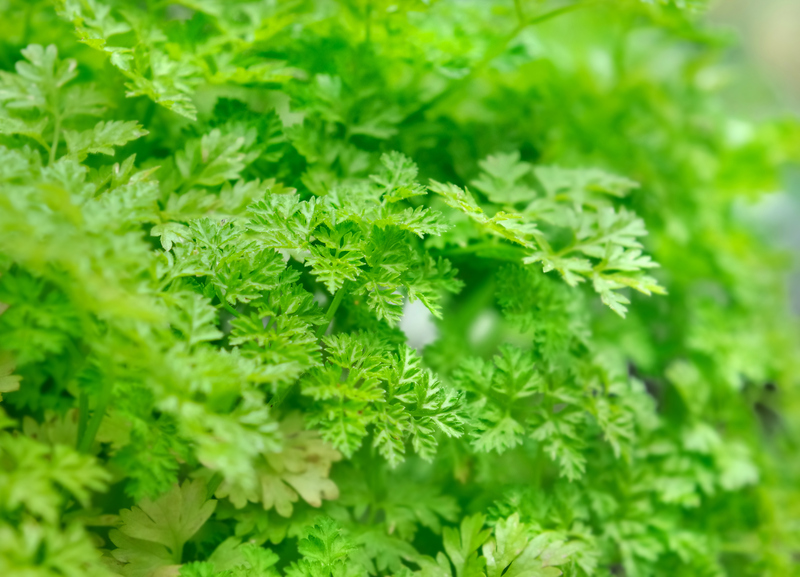Breathing Life into Earth: Organic Waste Becomes Fertile Soil
Posted on 04/06/2025

Breathing Life into Earth: Organic Waste Becomes Fertile Soil
Imagine a world where our food waste, yard trimmings, and even coffee grounds are not dumped in landfills but transformed into nutrient-rich soil. This isn't just wishful thinking--it's the core of a global movement toward sustainability, breathing new life into the earth by converting organic waste into fertile soil.
Table of Contents
- Introduction: The Journey from Waste to Wealth
- Why Composting Organic Waste Matters
- Types of Organic Matter That Become Fertile Soil
- The Science Behind Soil Enrichment
- Environmental Benefits of Recycled Organic Waste
- Popular Methods for Turning Organic Matter into Fertile Soil
- Urban Composting: Fertilizing Cities from Within
- How Farmers and Communities Harness Organic Waste
- Challenges and Innovative Solutions
- Breathing New Life: The Future of Organic Waste Recycling
Introduction: The Journey from Waste to Wealth
Organic waste--the remnants of our kitchens, gardens, and farms--was long seen as rubbish, destined for landfills where it decayed and released greenhouse gases. But today, that narrative is changing. Around the globe, people are awakening to the powerful potential of turning organic waste into fertile soil, restoring ecosystems, and feeding the earth rather than polluting it.
This transformation isn't just about gardening; it's about rethinking our relationship with waste, food, and the planet itself. By breathing life into the soil through composting and organic recycling, we nurture our environment and create a circular economy where nothing is wasted.
Why Composting Organic Waste Matters
Organic composting is more than a backyard hobby--it's a tool for environmental restoration and sustainable agriculture. Here's why converting organic waste into rich, life-giving soil is essential:
- Reduces Landfill Waste: Organic material makes up a large portion of municipal waste. Composting keeps these valuable resources out of landfills, dramatically reducing the volume of trash.
- Prevents Pollution: When organic waste decomposes in landfills, it produces methane, a potent greenhouse gas. Proper composting traps carbon in soil, fighting climate change.
- Improves Soil Quality: Compost enhances soil structure, moisture retention, and nutrient levels, which boosts crop yields and plant health.
- Saves Money: Natural compost reduces the need for chemical fertilizers and irrigation, lowering farming costs and supporting sustainable practices.
- Supports Biodiversity: Healthy, organic-rich soils foster beneficial microorganisms, earthworms, and insects, which are vital for robust ecosystems.
Types of Organic Matter That Become Fertile Soil
What qualifies as organic waste? The list is longer and more diverse than you might think, offering multiple sources for natural fertilizer:
- Food Scraps: Fruit and vegetable peels, eggshells, coffee grounds, tea bags, bread, and more.
- Yard Trimmings: Grass clippings, dead leaves, small branches, pruning waste, and wood chips.
- Paper Products: Uncoated cardboard, paper towels, and napkins (if free from chemicals and synthetic materials).
- Manure and Farm Waste: Animal manure, straw bedding, and crop residues from sustainable, chemical-free sources.
- Other Biodegradables: Nut shells, cotton lint, and natural fibers.
All these materials--when composted properly--become life-restoring, fertile soil.
The Science Behind Soil Enrichment
The process of transforming organic waste into soil is elegantly natural. Microorganisms--bacteria, fungi, and actinomycetes--alongside earthworms and insects, decompose waste and convert it into humus: the dark, crumbly substance essential for soil health.
The Composting Process Explained
- Stage 1: Mesophilic Phase (Initial Decomposition): Moderate temperature microbes begin breaking down sugars and proteins.
- Stage 2: Thermophilic Phase (Heating Up): As the pile heats up, thermophilic microbes digest tougher materials such as cellulose, killing weed seeds and pathogens.
- Stage 3: Cooling and Maturation: The compost cools. Fungi, actinomycetes, and earthworms move in, fine-tuning the decomposition and enriching the soil.
The result? A blend of microorganisms, minerals, and organic matter that restores fertility to depleted soils, supports plant growth, and sustains life above and below ground.
Environmental Benefits of Recycled Organic Waste
Turning organic waste into fertile soil isn't just a convenience; it is an environmental necessity. Here are some key benefits:
- Reduces Greenhouse Gas Emissions: Organic materials in landfills generate methane, a greenhouse gas more potent than CO2. Composting dramatically curbs these emissions.
- Improves Water Retention: Compost-enhanced soil holds water better, reducing the need for irrigation--which is vital in drought-prone regions.
- Rehabilitates Damaged Soils: Applying compost to eroded, compacted, or nutrient-depleted land revitalizes the soil, making it productive once more.
- Cleans Up Contaminated Areas: Compost can bind heavy metals and pollutants, helping to detoxify soils near industrial sites.
- Enhances Carbon Sequestration: Composting locks atmospheric carbon in soil, slowing climate change and preserving biodiversity.
Popular Methods for Turning Organic Matter into Fertile Soil
Whether in rural communities, urban centers, or individual homes, there are several tried-and-tested ways to transform organic waste into fertile ground.
1. Backyard Composting
- Open Pile Method: Simple and effective--layer greens and browns in a corner of your yard, turning regularly for aeration.
- Enclosed Bins: Contain compost neatly and are especially suitable for small spaces and urban gardens.
2. Vermicomposting (Worm Composting)
Utilizing specific worms (usually red wigglers), vermicomposting breaks down organic waste rapidly and produces worm castings--an exceptionally rich organic fertilizer.
3. Bokashi Composting
Originating from Japan, this anaerobic process uses a special mix of microorganisms to ferment food waste, including items that regular composting cannot handle (like dairy and cooked foods). In just weeks, waste becomes compost-ready material.
4. Industrial Scale Composting
- Windrow Composting: Organic waste is piled into long rows and mechanically turned, speeding decomposition.
- In-vessel Composting: Enclosed containers tightly control temperature and moisture, allowing for efficient, high-output compost production.
- Aerated Static Pile: Air is forced through large static piles, ideal for processing vast quantities of organic waste rapidly.
Urban Composting: Fertilizing Cities from Within
As cities grow, so does the challenge of handling organic waste. Urban composting programs--ranging from community gardens to municipal curbside pickup--play a critical role in revitalizing urban soils and supplying green spaces with vital nutrients.
- Community Compost Hubs: Neighborhoods create local drop-off points, engaging residents and supporting urban farms.
- Green Roofs and Parks: Cities recycle compost to nurture public gardens, parks, and green roofs, improving air quality and biodiversity.
- Zero-Waste Initiatives: Urban composting aligns with broader zero-waste strategies, reducing the need for landfill space and promoting sustainability.
Through these initiatives, even the densest cities can contribute to breathing life back into the planet--one banana peel at a time.
How Farmers and Communities Harness Organic Waste
Many innovative agricultural and community projects have set inspiring examples by turning organic waste into productive, life-restoring soil:
- Regenerative Farms: Many small and large-scale organic farms compost their own waste--crop residues, animal manure, and processing by-products--to build soil health without synthetic chemicals.
- Agricultural Cooperatives: Farmers join forces to build centralized composting facilities, enabling cost-effective waste management and shared soil improvement.
- Eco-Schools and Campus Gardens: Schools collect cafeteria waste and use it to fertilize educational gardens, teaching students the full food cycle from table to soil and back again.
- Community Supported Agriculture (CSA): By composting community food scraps, CSA operations close the loop, returning nutrients to the ground and educating consumers.
From rural pastures to bustling city blocks, every community has the opportunity to turn their organic waste into a resource for the future.
Challenges and Innovative Solutions
Despite the clear benefits, turning organic waste into fertile soil faces some hurdles:
- Contamination: Non-compostable plastics, chemicals, and inorganic materials can infiltrate compost bins, undermining quality.
- Odor and Pest Issues: Poorly managed compost can attract rodents and emit unpleasant smells, especially in densely populated areas.
- Lack of Infrastructure: Many communities lack easy access to composting facilities or curbside collection programs.
- Public Awareness: Many people aren't familiar with proper composting techniques or the importance of separating organic from inorganic waste.
Innovative Solutions
- Educational Campaigns: Workshops, school programs, and online resources teach proper composting and sorting of waste.
- Technological Advances: Smart bins, sensor-driven composters, and app-based programs are making it easier than ever to compost, even in small apartments.
- Government Incentives: Policies, grants, and incentives are encouraging more homes and businesses to adopt composting and reduce landfill reliance.
- Partnerships: Collaboration between municipalities, businesses, and non-profits is bringing large-scale composting projects to life.
Breathing New Life: The Future of Organic Waste Recycling
The promise of breathing life into earth through organic waste recycling is immense. As technology advances and society's commitment to sustainability deepens, the practice of turning organic fragments into rich, fertile soil is poised to become the norm rather than the exception.
Emerging trends such as precision composting, urban composting collectives, and blockchain-driven waste tracking are making it easier to return nutrients to the land and build resilient food systems. Policy shifts, increased funding, and growing consumer demand for sustainable products are pushing farms, cities, and individuals to rethink organic waste at every level.
How You Can Start Breathing Life into the Earth
- Start a compost pile at home, in your backyard, or on your balcony.
- Join a local composting program or community garden and contribute your food scraps.
- Advocate for compost-friendly policies in your city or workplace.
- Educate others about the environmental, economic, and social benefits of making fertile soil from organic waste.

Conclusion: A Soil Revolution for Our Planet
The movement to transform organic waste into fertile, life-breathing soil is more than an environmental trend--it is an essential strategy for restoring balance to Earth's ecosystems and securing the future of food, water, and clean air.
By composting at every scale and embracing innovative solutions, we can all participate in this soil revolution. Every banana peel, grass clipping, and coffee ground diverted from the landfill is a gift to future generations. Together, we have the power to breathe life into the Earth--starting from the soil up.
Let's give back to the planet, one compost pile at a time. The earth's new life awaits beneath our feet.
Latest Posts
Transforming Your Yard into a Child's Wonderland
Unlock the Secrets to Cultivating a Vibrant Herb Garden
Smart Techniques for Weather-Proofing Your Garden



